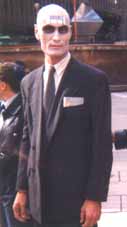In 1998, four men in Sydney stood outside the Commonwealth Bank building in Martin Place, distributing slips of paper that claimed the banks of the world were planning to bring in a computerised micro-chip implant which could be placed under the skin on a person's hand. They said that the implant would act as a "smart card", keeping track of a person's income and expenditure. It would only need to be waved under a scanner to have funds instantly deposited or withdrawn from the owner's bank account.
The pamphlet went on to say that the planned technology was part of a spiritual conspiracy which had been prophesied in the Bible, and that it should be resisted as evil, or even satanic.
 The men all wore black suits, and their faces were painted white. On their foreheads they had written the number 666, under an enlarged picture of a computer barcode. Their behaviour, apart from their appearance, was quiet and orderly.
The men all wore black suits, and their faces were painted white. On their foreheads they had written the number 666, under an enlarged picture of a computer barcode. Their behaviour, apart from their appearance, was quiet and orderly.One of them, Paul Henry, went into the bank at some time during the day to make a deposit in his account. While waiting in line he was ordered to leave the bank by the bank manager. When he refused to leave the queue, the police were called and he was arrested for "trespassing", taken to court, and found guilty.
But the punishment did not stop there. Paul's bank account was closed, and he was declared to be persona non grata with every Commonwealth Bank in Australia. To this day, he is not allowed to open an account with the Commonwealth Bank. What is more, the bank managed to learn the names of the other protestors, and they too have been banned from holding a bank account with the Commonwealth, despite the fact that they were never charged, arrested, or even challenged by bank officials. What the men were saying in their protest has been amply illustrated through their treatment in the years since the protest. They were saying that the banks exercise unwarranted (and largely unchallenged) control over the lives of all people in our society. They were saying that the power of the banks is growing every day. They were saying that the banks will one day be able to inflict punishments which will make people totally incapable of carrying out everyday business transactions.
Banks like the Commonwealth, already maintain lists of people whom they have specifically targetted for retribution. They do not believe that free speech should go so far as to allow people to criticise their plans to control the economy, and they are already taking action to penalise anyone who challenges them along these lines. If an Australian Government or any political party in Australia were to employ such clandestine tactics against their opponents, there would be a public outcry. But the banks, like the media, have succeeded in keeping themselves free of such accountability. At times the banks and media even conspire together to stop what they regard as dangerous criticism.
The media benefits from the huge advertising revenues that come in from the banks, and they cannot afford to print anything that seriously undermines faith in the banks. An institution, like the Commonwealth Bank, which is prepared to use its powers vindictively against four nondescript protestors would not hesitate to take action against any journalist who would dare to challenge their right to govern. Whether people are seen to be questioning the fairness of the legal system, the rightness of sexual taboos, the accountability of the media, or the hidden agenda of the banking community, the system has ways of dealing with such people, and it all goes pretty much unnoticed by the general public. In one way or another, a sock is stuffed into the mouths of those who dare to raise their voices against the status quo, and they are effectively excommunicated.

